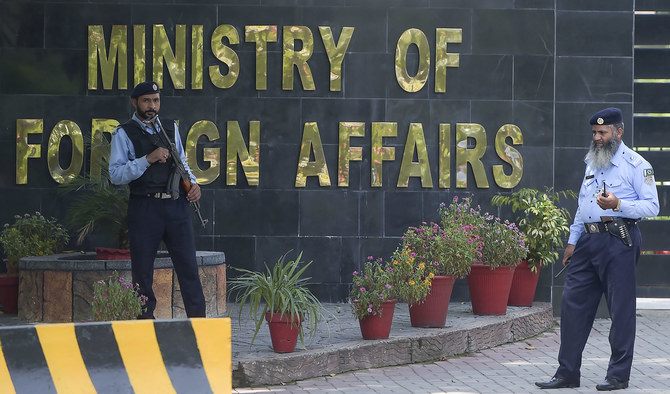KARACHI: A five-story residential building collapsed in Karachi’s densely populated Lyari neighborhood on Friday, killing at least 10 people and trapping many others, in yet another tragedy underscoring the city’s crisis of unsafe, aging structures.
Rescue workers, aided by local residents, scrambled to pull people from the debris of the Fotan Mansion building, recovering both bodies and injured survivors. The collapse took place around 10:30 a.m., jolting the community.
“I suddenly woke up … it felt like there were tremors, like an earthquake,” said Salman Ahmed, who was sleeping in a nearby building at the time of the incident and later rescued two children.
“At the moment the building collapsed, nothing was visible,” he recalled. “There was so much dust and smoke that no one could understand what had happened. “We could hear voices coming from underneath [the rubble].”
It was not immediately clear how many families lived in the building, but residents estimated that around 40 people were inside when it collapsed. Many of the occupants were members of the low-income Hindu minority community.
As of Friday evening, a large rescue operation was still underway, with cranes clearing debris and rescuers racing against time to reach those still trapped beneath the rubble.
Senior Superintendent of Police Arif Aziz confirmed to Arab News “the death toll has reached 10.”
“They handed me a three-month-old baby girl, she was alive,” said Maya Sham, a relative of a family living in the building. “Right now, two of their sons and three daughters-in-law are still trapped. But we can still hear voices from inside.”
The collapse devastated families like that of Megbhai, a member of the Hindu community, which largely resided in the building.
Karachi Mayor Murtaza Wahab confirmed that six people had died and eight were rescued alive. He said the building had long been on the city’s “danger list.”
“This building was declared dangerous, and a couple of notices were issued to the occupants to vacate because of its structure,” Wahab told Arab News at the site. “But unfortunately, people chose to risk their lives, and they did not vacate.”
Pakistan’s largest city — home to over 20 million people — faces a chronic housing shortage. Many low-income residents live in dilapidated buildings that have escaped regular maintenance. Authorities have declared nearly 588 buildings dangerous in Karachi, most in the congested Old City area.
According to the Sindh Building Control Authority (SBCA), Fotan Mansion had been declared unsafe as far back as 2012.
“This building was declared dangerous by the SBCA in 2012 and had been served multiple notices over the years,” SBCA spokesperson Shakeel Dogar told Arab News. “Before the recent rains, public announcements were also made in the area, but unfortunately, no one was willing to vacate,” he said, adding that it was the responsibility of the district administration to enforce the SBCA’s evacuation directives.
Mayor Wahab said rescue efforts remained the top priority, with accountability and investigation to follow.
“Our administration, our machinery is here on the ground,” he said. “Once we’re done with the rescue aspect, we will focus on who was responsible for this negligence or omission.”
RECURRING TRAGEDY
Friday’s incident is the latest in a string of deadly building collapses in Karachi.
In February 2020, a five-story building collapsed in Rizvia Society, killing at least 27 people. The following month, another residential structure came down in Gulbahar, claiming 16 lives.
In June 2021, a three-story building in Malir collapsed, killing four. And just last year, in August, a building collapse in Qur’angi led to at least three deaths.
Most of these structures had either been declared unsafe or were built without proper approval.
Experts say that despite repeated disasters, there has been little progress in enforcing building codes or relocating residents from hazardous structures.
“The incident of the building collapse in Lyari is deeply tragic,” said Muhammad Hassan Bakhshi, chairman of the Association of Builders and Developers of Pakistan (ABAD). “It is alarming that despite having a list of dangerous buildings, the SBCA did not take action to get them evacuated.”
He urged the Sindh government to reassess buildings citywide and equip rescue teams with modern tools and technology.
With hundreds of buildings still listed as unsafe, authorities now face mounting pressure to prevent future disasters.
“The way out is that we must follow what the law says,” said Mayor Wahab when asked if anyone would be held accountable. “If citizens don’t listen to us, the political leadership and the administration have to play their part to convince those people.”
“Nobody wants to leave their house... but we must learn from our mistakes and ensure no such untoward incident takes place in the future,” he said.

















